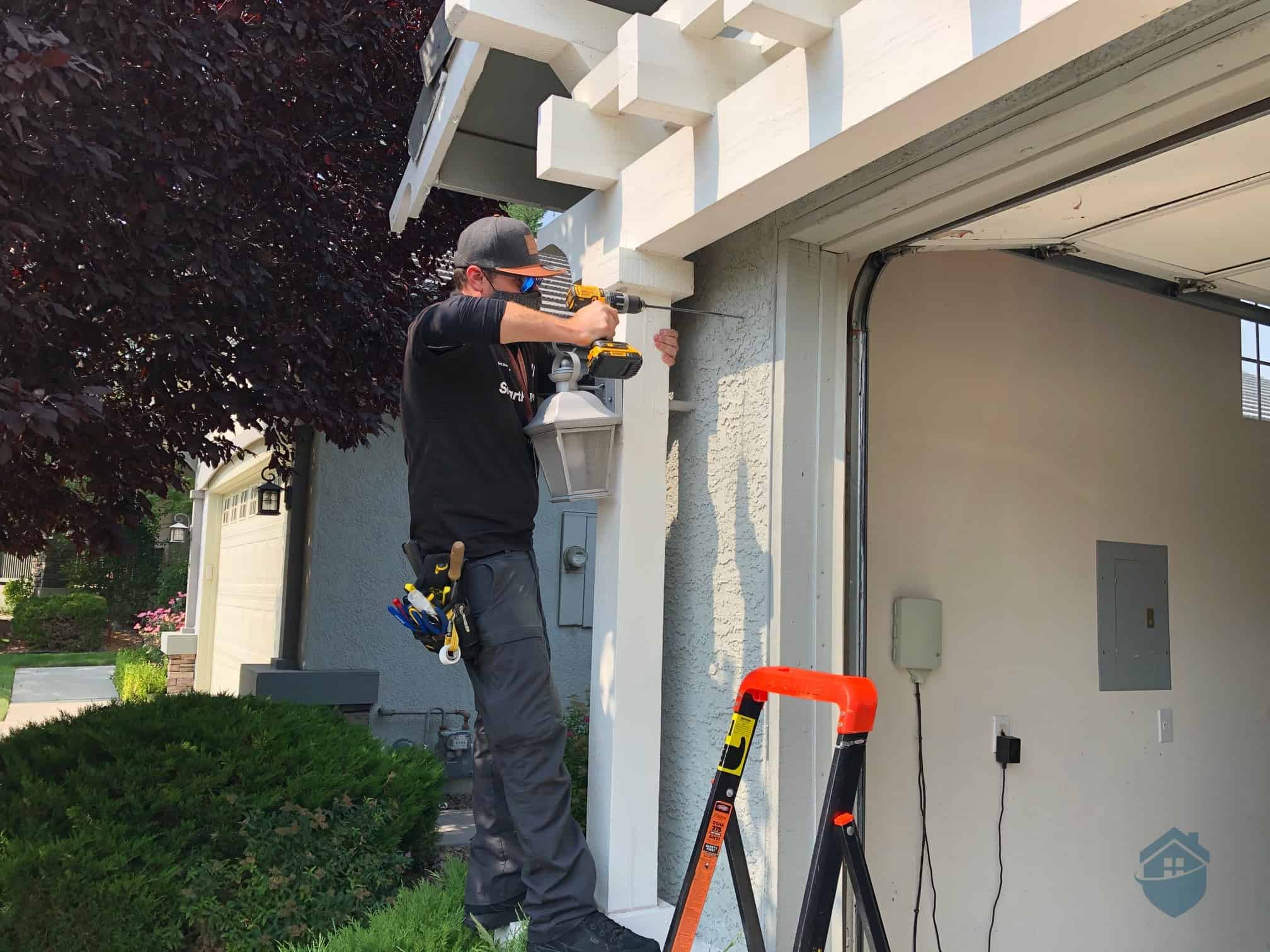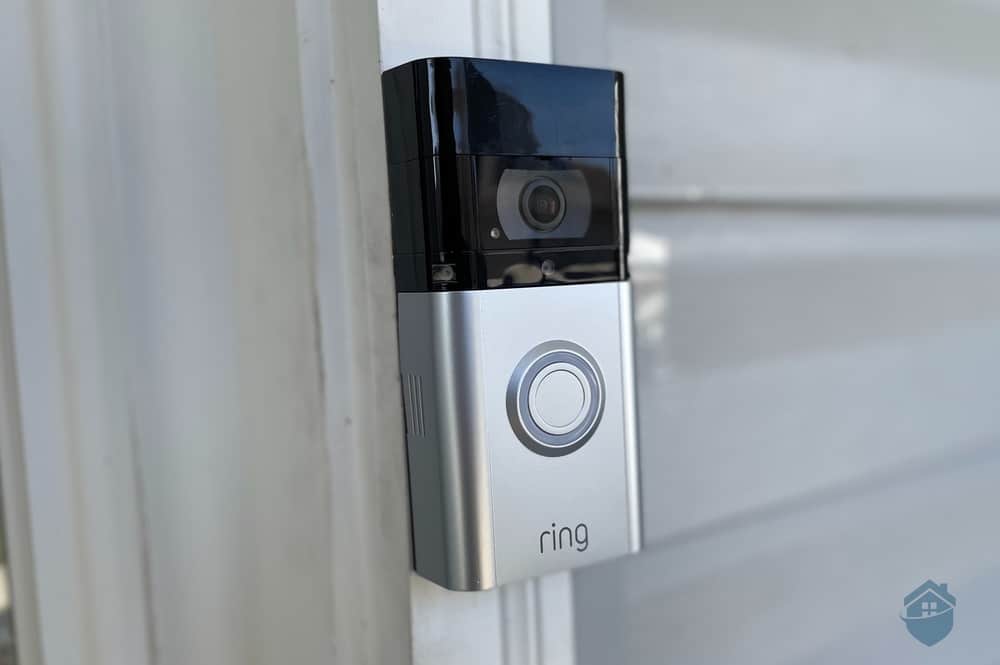Vivint and Ring home security systems are both extremely functional. They offer a wide variety of features, but there are key differences when it comes to pricing, installation, technology, and 24/7 monitoring. Have a look at how these two popular brands measure up against one another.
The home security market offers a wide range of options, and that becomes clear when you look at Vivint and Ring side-by-side. Vivint is a premier home security brand that offers bespoke security systems tailored to each user’s security needs. It focuses its protection around professional monitoring, as well as its strong home automation capabilities. Ring, on the other hand, can still be tailored to your needs, but you’d do that on your own. There are no expert consultations or professional installation. The upside is that Ring’s costs are lower and it’s more budget-flexible because professional monitoring is optional.
After testing both systems side-by-side, we’ve decided to give Vivint higher marks. This doesn’t mean that Ring is a poor choice – both systems made our list of the best security systems of 2026, meaning they are the best of the best. But, if you keep on reading, you’ll find out why we recommend Vivint over Ring (and why some might want to choose Ring over Vivint).

Senior Editor Andrew Garcia unboxing the Vivint Outdoor Camera.
Overview of Vivint and Ring
A little background might help you better understand how vastly different Vivint and Ring are. Vivint started off nearly three decades ago, and, from the beginning, they’ve been installing home security systems built around sensors and security cameras. Professional monitoring has also been a part of its offering ever since. On the other hand, Ring started off in 2013 as a manufacturer of doorbell cameras. They actually pioneered that industry, but didn’t have a full-fledged security system until five years later.
Today, the difference between Ring and Vivint has narrowed. When we shopped for both systems, we saw that they offer:
- Multiple security cameras, including indoor, outdoor, and doorbell cameras
- Security and environmental (smoke, CO, water) sensors
- Professional monitoring services (but Ring’s is optional)
- Home automation capabilities and smart home integrations
>> Related: The Best Security Systems With Home Automation

Ring Alarm (2nd Gen) equipment
If you look closely, though, you’ll still notice some stark differences, such as:
- Vivint requires professional monitoring, while Ring is a DIY system.
- Ring home automation is limited to Alexa and a few other third-party devices, while Vivint works with a wide range of smart home brands.
- Ring offers over a dozen different camera models, while Vivint has only one indoor, outdoor, and doorbell camera each.
- Vivint’s prices tend to sit on the upper end of the industry, while Ring positions itself as an affordable security solution.
Let’s zoom in on those similarities and differences.
Similarities Between Vivint and Ring
Beyond the basic similarities we mentioned above, we noticed a few things that Vivint and Ring do similarly during testing. One is how security cameras take a central role in their protection.
Vivint and Ring Security Cameras

Our Vivint Outdoor Camera Pro before it was installed outdoors.
While Vivint offers fewer security camera options than Ring, they have a feature called Smart Deter. This is basically a customizable, rule-based protection that lets you set parameters that trigger the camera’s built-in deterrents. For example, we set our Vivint Outdoor Camera Pro (pictured above) to play a soft chime and activate its LED ring when it sees a person lurk within our property for more than two minutes. We think this is a great feature for deterring burglars before they even get into our home.

Boxed Up Ring Security Cameras
As for Ring, two of its security cameras have built-in lighting – the Spotlight Cam and the Floodlight Cam – and both are great at catching intruders off-guard. While we didn’t find it as customizable as Vivint’s Smart Deter, bright lights suddenly coming on as soon as an intruder steps into a restricted area can serve as a great deterrent. And, we were able to customize the detection zones and sensitivity of each Ring security camera we tested.
Home Security Tip: According to a reputable study, 83 percent of burglars look for signs of increased security before breaking in, and 60 percent would look for a different target if they saw security equipment such as security cameras.1
Vivint and Ring Apps
We also like how both Vivint and Ring make home security effortless and convenient. Most, if not all, security systems these days have apps, but Vivint and Ring’s apps stand out. Both made our list of the best home security mobile apps of 2026.

The Vivint Smart Home app’s home page, where arming controls are readily available.
We like Vivint’s app because even though it’s feature-rich, it’s simple to navigate and use. We found it easy to create automations (such as Smart Deter) in the app, something that a lot of people might find intimidating. At the same time, simple controls such as arming and disarming the system, activating routines, and checking security camera footage are all easily accessible.
Ring’s app also proved indispensable during testing. Unlike Vivint, Ring’s security system (Ring Alarm), security cameras, and doorbell cameras are separate offerings. Yet, when you connect them to the app, they become a cohesive system. Whenever alerts from our Ring Alarm came in, we’d simply open the notification and the app would lead us to our security camera live feeds. From there, we could also access our recording history to investigate further.
>> Resources: These 3 Steps Could Save Your Life During a Home Invasion
Want help choosing a security system?
Answer 8 simple questions and we'll recommend the system that is right for you.
Start QuizVivint and Ring Differences
Despite those similarities, it’s undeniable that Vivint and Ring serve different security needs. The good news is that by looking at their differences, you’ll most likely find which system is better for you. Let’s take a look at the main differences between Vivint and Ring.
Vivint vs. Ring Equipment
Vivint’s home security equipment revolves around the Vivint Smart Hub – a touch-screen controller. It’s the brains of the system, and it’s actually one of the best control panels we’ve used – even compared to other touchscreens like the one from the Cove system we tested. We say that because it can stream live camera feeds and even patch you through Vivint’s monitoring center during emergencies.
We also found that Vivint’s equipment lineup is more well-rounded than Ring. Besides the basics like entry sensors and smoke alarms, Vivint offers specialized equipment such as garage door sensors and recessed door sensors.
>> Find Out More: The Best Security Systems for Homes With A Garage

When idle, our Vivint Smart Hub doubles as a weather display.
As for Ring Alarm, the sensors are simple and basic. The hub has no controls whatsoever, either. We used the wireless, analog keypad to arm and disarm the system, but that’s about all it could do.
What we appreciate from Ring is the vast lineup of security cameras and doorbell cameras. Sure, Vivint’s outdoor camera is impressive, but if you have specific needs – let’s say, a battery-powered outdoor camera that can go anywhere – Ring is the better choice. All its outdoor models have battery-powered options. It also offers some of the best solar-powered cameras we’ve tested. And, we haven’t even gotten to Ring’s doorbell camera options yet. With seven options to choose from, you can really dial in your home’s video coverage.
>> See What We Think: Our Hands-On Ring Doorbell Cameras Review
Winner: Vivint is overall better. Most of its equipment is higher quality compared to its Ring counterparts. That said, if you’re looking to cover your home with security cameras, Ring offers more options.
Vivint vs. Ring Installation
How you want your system installed is a matter of preference, but, if you want professional installation, we confidently declare that Vivint is one of the best professionally installed systems. You can read all about our Vivint installation experience, but, essentially, the service was white-glove from start to finish. The Smart Home Pro (technician) even scouted our home to recommend the best places to install security cameras and sensors.

Jamie, one of our testers, installing the hardwired Ring Floodlight Cam by herself.
Not to be outdone, though, Ring is one of the best DIY-installed systems we’ve tested. We managed to set up our Ring Alarm in under 30 minutes, and, for cameras, the average time for each was five minutes for battery-powered models and 10 minutes for wired models. We didn’t count the Floodlight Cam, however; that one took us 45 minutes because it needed hardwiring (pictured above).
Winner: We’re giving this section to Ring based on the fact that it offers both DIY and professional installation (via a third-party service provider). However, if you’re looking for a professionally installed system anyway, we believe Vivint’s in-home technicians will do a better job.
Vivint vs. Ring Pricing
We believe both Vivint and Ring offer good value, which to us is a function of price and functionality. You’ll pay more for a Vivint system, but you’ll get better home automation features, more and better equipment options, and an overall better service. With Ring, the security system is not as tailored, you’d have to install the system yourself, and you get fewer home automations capabilities, but you’ll pay less.
A Vivint system starts at $599, and monthly costs for monitoring start at $29.99 but can go up to $49.99 if you add security cameras (for cloud storage and video verification). Installation fees scale with the system, but expect to pay $100 to $200 for a mid-size system. We paid about $200 for an eight-piece Vivint system with security cameras. Also, keep in mind that a contract is required if you finance your equipment. Vivint’s contracts can be up to 60 months, and, during that time, you’re required to keep your monitoring subscription.

As part of the installation service we paid for, the Vivint Smart Home Pro did the hard part of installing our wired Outdoor Camera Pro.
Ring’s equipment packages start at $199, and you don’t need a monthly fee. You can self-monitor your Ring Alarm. If you choose professional monitoring, however, the fee starts at $19.99, but you don’t have to sign a contract. And, take note, cloud storage for unlimited cameras is included in that fee. You don’t have to pay for installation, either. And, being an Amazon brand, you can purchase Ring equipment at a discount during sales.
Winner: Let’s call this a tie, and we’d suggest picking a security system based on your budget. If your budget permits, you get better quality protection from Vivint. However, if you’re trying to save money, Ring is a reliable, affordable option.
Advanced Technology
Vivint and Ring both offer the latest in technology, but they have different areas of focus. Vivint offers smart home security features, using automation to improve home security and comfort. Ring, on the other hand, offers advanced security camera features. Both are useful.
With Vivint, we were able to set up automations to make our home safer. We scheduled lights to turn on at a certain time whether we were home or not; we set our front door to automatically lock when we armed Vivint on our phone; and we even set some outdoor lights to turn on if Vivint detected a potential intruder.

We used Vivint’s customizable app to create personalized notifications and automate routines and actions.
With Ring, advanced technology has allowed us to better monitor our home. For example, our Spotlight Cam Pro offers a simulated bird’s-eye view of our front yard to show the path visitors take to our home. In case there’s a break-in, we could use the data to improve our security. We are, however, disappointed that some features require a subscription. For example, Smart Video Search. Ring’s video AI can search recorded footage. You can type in “red sedan” and it will show all your clips where a red sedan is in the frame. This can make retrieving evidence easier, but it requires the Ring Home Premium plan, which is the top-tier cloud subscription plan from Ring.
Winner: Vivint takes this one because we found its advanced features more useful and practical. Plus, they’re not exclusive to security cameras. Vivint’s automation features can apply to Z-Wave devices and devices from compatible third-party brands.
Our Vivint and Ring Recommendations
Vivint and Ring are both great security systems, which means no matter which of the two you prefer, you can’t go wrong. They both have our stamp of approval. That said, here are some recommendations for you so you can get the most from your home security pick.
If You Go With Vivint…
Vivint is a premium security system, and to make the most out of your investment, we recommend going all in. That means getting security cameras, home automation gear, and signing up for the top-tier monitoring plan.

Residential smart locks like this can work as a makeshift access control system.
Doing that will cost you, even though it’s the best way to take advantage of all the advanced features Vivint offers. For instance, the outdoor camera alone costs $399, while the Vivint Doorbell Camera costs $199. Take a hard, close look at your security needs and only get equipment you need. You don’t need to buy unnecessary equipment to make the most out of your Vivint system.
>> Learn More: Our Vivint 2026 Home Security Review
If You Go With Ring…
Although Ring doesn’t require professional monitoring, we recommend getting a Ring Alarm system and signing up for a monitoring plan. To do that, you’ll need either the Ring Home Standard ($9.99) or Premium ($19.99) cloud subscription and the $10-per-month professional monitoring add-on.
As for equipment, start with a Ring Alarm system with enough sensors to cover every entryway. From there, you can work your way outside and get security cameras and doorbell cameras. We also recommend keeping an eye out for bundles. Although security systems and cameras are offered separately, Ring often offers discounted bundles that include both.
>> Learn More: Our 2026 Ring Alarm Review
Summary
We’re really impressed with both Vivint and Ring. These systems are top-of-the-line in terms of features, monitoring capabilities, and service.
Overall, we have to say that Vivint is the better system, with a couple of caveats to keep in mind. First, you’ll probably have to sign a long-term contract (no biggie if you plan on living in your home for a few years). You’ll also pay more for the system compared to Ring, but that’s to be expected considering its powerful security and smart home capabilities.
If those are deal-breakers, Ring might be the better choice. You’ll sacrifice equipment quality a little bit, and you won’t enjoy advanced smart home functionalities, but it’s affordable and reliable.









